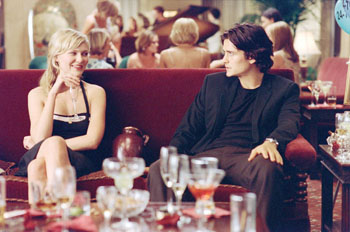![[Metroactive Movies]](/movies/gifs/movies468.gif)
[ Movies Index | Show Times | Silicon Valley | Metroactive Home | Archives ]

Space Gap: Orlando Bloom keeps his distance from Kirsten Dunst in 'Elizabethtown.' Kentucky Pain Kooky stewardess meets grieving businessman in Cameron Crowe's unfunny, unromantic romantic comedy DIRECTOR Cameron Crowe would love to blame the pasting he's going to get for his new film on cynics. At least Crowe is emotionally prepared for the results, seeing as the first 15 minutes of Elizabethtown constitute an essay on failure. He claims that any small-timer can fail, but it takes a major-league player to create a real fiasco. How well that argument works in the face of Crowe's last film, Vanilla Sky, is a matter of opinion—did that particular star-driven remake have the stature of a grand failure? The failure of the shoe-biz exec Drew (Orlando Bloom) is illuminated with one sharp joke: the soon-to-be corporately decapitated exec is told to "watch his head" as he gets out of the company helicopter. Drew designed a sports shoe for a Nike-like company that has been recalled by the ton. Having lost the company nearly a billion dollars and having been summarily dumped by his trophy girlfriend (Jessica Biel), Drew prepares for a comical suicide. He is, however, interrupted by the news of his father's sudden death and required to head to suburban Louisville to iron matters out with his dad's side of the family. On the deserted red-eye flight to Kentucky, Drew is accosted by a flight attendant named Claire (Kirsten Dunst), who takes him under her wing. He meets his relatives—stock comic types all, with the exception of his closest cousin, a rock-loving failure (Paul Schneider of All the Real Girls) who needs to be more of a parent to his squalling, out-of-control kid. Meanwhile, Drew fields desperate phone calls from his mother (Susan Sarandon) and his sister (Judy Greer); the funeral is in dispute, troubled by the problem that the Southern folks have never even heard of cremation. This rom-com from the director of Jerry Maguire and Say Anything was poorly received at the Toronto Film Festival. Crowe quickly whittled off an hour (including one of the film's three-in-a-row endings). What's onscreen is no longer three hours of sprawling twaddle; now, it's two hours of misshapen twaddle. Some misfortunes aren't Crowe's. He couldn't be expected to know that Jim Jarmusch was going to do a smarter version of Elizabethtown's last 20 minutes in his film Broken Flowers. Even without seeing the original, you can see where Crowe cut; the film resolves its story with a collection of punch lines without setups or dilemmas. Sarandon's episodes seem to have suffered the most. Manic after the death of her husband, she signs up for a series of arts, crafts and performance classes. Even though the time frame is two weeks, it's as if she went through the entire Open Exchange catalog. Meanwhile, the machinery that keeps Claire from Drew is rusty. The gears slip. And, as always in Crowe, the soundtrack labors under the burden of having to try to provide mood and meaning. There have been poorly directed, motiveless, unconvincingly acted romantic comedies before, and they've still worked on some level. Young actresses can always flash their vulnerable side. Dunst knows hers: the appealingly crooked incisors, the slightly oversized clothes that keep slipping on her shoulders. Bloom—a dazed post-grunge matinee idol—is the kind of unthreatening boy actor that girls name their guinea pigs after. But effective movies have been made from such performers. Before this, road scenes injected romantic comedies with wanderlust, to make up for the lack of any other lust. The farmscapes inspired what H.L. Mencken once described as "the imbecilic barnyard joy of the human kohlrabi." Why don't they work here? It is the film's relentless emphasis on the optimistic side of life that makes it particularly lethal. Crowe pumps the audience's faith that Norman Rockwell could still find models if he needed to. Crowe insists that there will be poignancy when we hear "My Father's Gun," Elton John's wanton filchery of the Band's "The Night They Drove Old Dixie Down." But the national mood has wised up a little since Crowe stuffed Jerry Maguire with Successories mottos. Crowe made his decision to overlook the United States that so many of us know so well—of pink slips, repetitive-stress syndrome, school shootings and thin beer. If cynics doom Elizabethtown, it's because circumstances have made so many cynics. This time around, the question should be asked: Does Crowe believe this stuff himself, or does he feel like the audience would be better off if they believed it? I lean to the latter; there's no conviction in the way he's brought this couple together. Crowe misreads the ideas of Billy Wilder. When ransacking The Apartment, he decided to make the movie about a guy of the class of Fred MacMurray's Sheldrake, rather than Jack Lemmon's insignificant clerk Bud Baxter. If Crowe is the Wilder of our time, he's not just the Wilder who won't go near such touchy topics as the ones seen in Ace in the Hole and Double Indemnity. He's also the kind of Wilder who instinctively identifies with the kind of movies his producers want to see. There's none of classic-era cinema's tension between art and commerce in Elizabethtown, just a succumbing to the moldiest tendencies of business as usual.
Elizabethtown (PG-13; 123 min.), directed and written by Cameron Crowe, photographed by John Toll and starring Orlando Bloom and Kirsten Dunst, opens Friday valleywide.
Send a letter to the editor about this story to letters@metronews.com. [ Silicon Valley | Metroactive Home | Archives ]
|
From the October 12-18, 2005 issue of Metro, Silicon Valley's Weekly Newspaper.
Copyright © 2005 Metro Publishing Inc. Metroactive is affiliated with the Boulevards Network.
For more information about the San Jose/Silicon Valley area, visit sanjose.com.